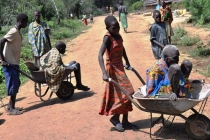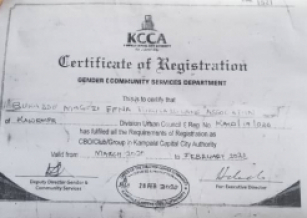Ku ludda olulala ate gy’osanga abasibe abasajja abatembeeya ebijanjaalo, kasooli n’ebyamaguzi ebirala.
Ebibagatta biri bisatu byokka; bonna basibe abali mu yunifoomu y’ekkomera eya kyenvu, bonna bava mu kkomera e Luzira era bonna basibira mu kifo kimu – Namuwongo mu Kampala.
ABASIBE ABAGULA BAMALAAYA BAFULUMA BATYA EKKOMERA?
Wadde Luzira limanyiddwa ng’ekkomera erikanga buli alina ekirowoozo ekizza omusango, bw’osanga abasibe abasajja abataayaaya mu Namuwongo Bukasa, Kisugu, osigala weebuuza engeri gye bafuluma!
Ekisooka okukwewuunyisa y’engeri gye bateembeeya ebintu omuli ebijanjaalo, obummonde, obuwunga, ebiruke n’ebintu ebikalu ebirala.
Oba okyali ku batembeeya ebyamaguzi, ate n’osisinkana abali mu birabo by’emmere nga batumya buli kye baagala okulya.
Omusibe omu gwe twasanze mu kirabo ky’emmere ng’atumizza amatooke n’akalo yavudde mu mbeera ng’omuwala aweereza mu kifo ekyo aluddewo okumuleetera obusera bwe yabadde amutumye anywekereze emmere emukke bulungi mu ntumbwe.
 Ono omusibe alina essimu ne leediyo naye akola gwa butembeeyi.
Ono omusibe alina essimu ne leediyo naye akola gwa butembeeyi.Mu kubuuza gy’aggye ssente, bakwanukula mangu nti ensimbi zivudde mu bintu by’abadde atembeeya era abeera alinako omutemwa, ate ng’omutemwa omulala gwa baserikale b’ekkomera ababeera baamukkiriza okufuluma agende atunde ebyamaguzi.
Obeera okyewuunaganya ku musibe atuula mu wooteeri n’asaba buli ky’ayagala, n’okuduumira nga bw’aduumira ate ne bakutegeeza nti okumpi awo ku ka loogi mu Yoka Zooni e Namuwongo, abasibe bettanirawo nnyo.
Ku Lwokusatu waabaddewo olutalo ku loogi eyo era abatuuze abaagenze okudduukirira kyababuuseeko okusanga ng’ali mu lutalo, musibe okuva e Luzira mu yunifoomu ye.
Yabadde yeenyoola ne malaaya Fatuma oluvannyuma lw’okufuna obutakkaanya. Omusibe yabadde asasudde malaaya 5,000/- wabula malaaya n’amwefuulira n’awamba n’enkofiira omusibe gye yabadde atembeeya.
Enkofiira yabadde ya mutwalo era awo we waavudde olutalo. Abantu abasinga abaakuhhaanye, omusango baagusalidde musibe wadde nga tebaasoose na kumuwuliriza.
Ate naye bwe yawulidde amaloboozi g’abatuuze abasing nga bamubuuza ekyamuleese okugula malaaya ng’ate ateekeddwa kubeera mu kkomera, olwo n’abivaako n’akwata erimuzza e Luzira.
Abasibe abalala olumu basibira mu bbaala ne banywa ku twenge twe baba baludde okulozaako, kyokka bafuba obutagangayira kubanga okuddayo nga batagala kiba kigenda kubasuula mu ntata naddala mu bakama baabwe ababa babakkirizza okugenda okutembeeya ebintu enjuyi zombi (olw’omusibe n’olw’abaserikale) zifunemu.
Olumu bwe bawulira omwenge gubalippye enkalu, balinnya bodaboda ze zibazzaayo e Luzira.
 Omusibe omulala ng’atembeeya ebyamaguzi emisana ttuku.
Omusibe omulala ng’atembeeya ebyamaguzi emisana ttuku.BIZINENSI BAGIKOLERA KU SSIMU
Ebyamaguzi basinga kubitunda ku Lwakubiri kubanga e Namuwongo wabeerayo akatale k’omubuulo era bwe bamala okutunda nga nabo babaako bye beegulira era tekimanyiddwa oba babyetwalira ne babikozesa mu kkomera oba baba babigulidde bakama baabwe.
Okutuuka e Namuwongo bayita ku luguudo lw’eggaali y’omukka nga bava e Luzira era batambulawo kilommita nga ssatu zokka.
Abalala ebintu babitunda Bukasa kubanga awo kumpi nnyo ne Luzira. Wabula bwe bitaggwaawo nga beeyongerayo e Namuwongo ate nawo bwe batunda ne bitaggwaawo nga babyongerayo e Kisugu.
Mu kutuuka e Namuwongo bayita ku poliisi bbiri okuli ne poliisi y’e Kannyogoga eri ku luguudo lw’eggaali y’omukka wabula aba poliisi nabo tebabafaako, ne beeyongerayo nga bwe bayita abaguzi, “Obuwunga bwa lukumi, ebijanjaalo 1,200/- zokka…”
 Oluvannyuma lw’okutembeeya ono yayitiddeko mu tonninnyira okufuna ekyokulya.
Oluvannyuma lw’okutembeeya ono yayitiddeko mu tonninnyira okufuna ekyokulya.Olw’okuba tebabeera na buveera, ayagadde okugula amukyamya mu makaage n’amupimira ng’akozesa ebikopo era ebikopo bibiri bibalwa nga kkilo emu.
Obuwunga, ebijanjaalo, amata, obummonde, obusero n’ebiruke ebirala byonna bitundibwa ddondolo era kye kifudde abasibe bano abaganzi. Buli abaguzeeko aba tayagala kubavaako era bamaliriza bamuwadde ennamba y’essimu kw’ayinza okubafunira abaleetere ebyamaguzi ebirala.
Omu ku basibe ttiimu yaffe be yalondodde okumala wiiki eziwera, yatuuse n’okugamba kaasitooma omukyala nti; “Bw’okuba nga sikwata, ng’oweereza obubaka ku WhatsApp, ng’ontegeeza by’oyagala nkuleetere, olunaku lw’oyagala mbireete n’obungi bwe mba ndeeta.”
Amaliriza akkaatiriza nti, “W’onjagalira wonna we nzijjira…” Kiteeberezebwa nti essimu zino za bakama baabwe ababeera babawadde ebyamaguzi okubitunda.
Ebyamaguzi bwe bibeera ebingi, olumu babitambuliza ku kigaali era abamu bambalirako bbuutusi. Babagattirako bu leediyo obutono era abamu batambula bwe bawuliriza ennyimba za David Lutalo n’abayimbi abalala abaliko nga Bobi Wine.
Okutya okunene okuliwo mu kitundu be bantu abalaba abasibe abo engeri gye beeyagalamu era eky’okutya ekkomera ne kibaggwaamu nga basobola n’okwenyigira mu bumenyi bw’amateeka nga beeyinula nabo okuvaayo ne baddukanya emirimu gyabwe nga bulijjo.
 Abasibe abakyala nga bava okutema ebisagazi.
Abasibe abakyala nga bava okutema ebisagazi.Abalala batya nti abasajja abo abataayaaya bwe basisinkana n’abantu be bazzaako emisango, ebiddirira biyinza obutaba birungi kubanga gwe bazzaako omusango abeera agumidde ku kimu – “omuntu eyazza omusango baamusibira Luzira”!
EMBEERA Y’ABAKAZI YENNYAMIZA
Abasibe abasajja abatembeeya ebyamaguzi, olumu bayitira ddala ku baserikale b’amakomera abakuuma abakyala abasindikibwa okutema omuddo gw’ente mu kisaalu.
Abasibe abasajja bayitawo bafuuwa mpa, ng’eno abaserikale abakuuma abakazi bwe bakaayuukira abasibe abakyala okuyingira amangu ekisaalu bateme ebisagazi by’ente.
Abakyala bakuumibwa nnyo era bawalirizibwa n’okugenda mu mazzi wakati ne bavaayo nga bajonjobadde.
Abamu batuuka n’okuggyamu yunifoomu y’ekkomera ne bagenda nga kumpi bali bukunya nga tebeeteekera kutambulira mu yunifoomu eziddugalidde mu kisaalu.
Abasibe abasajja we bambalira bbuutusi, abasibe abakyala bayingira ekisaalu nga bali mu bigere era obweraliikirivu bubeera ku bulamu bwabwe n’endwadde eziyinza okuva mu mazzi amacaafu, n’emisota abatuuze gye bagamba nti gigumba mu lusaalu olwo e Bukasa.
Bwe bamala okutema ebisagazi nga babalagira okubyetikka okubitwala nga babiyisa ku luguudo lw’eggaali y’omukka ne batambula kkirommita nga ziizo okubituusa e Luzira.
Ayogerera amakomera ayanukudde
 Frank Baine
Frank Baine
Omwogezi w’amakomera mu ggwanga Frank Baine yasoose kugamba nti buli musibe alina okukuumibwa wabula oluvannyuma bwe yategeezeddwa nti ttiimu ya Vision Group yabadde ekuhhaanyizza ebifaananyi ebiraga abasibe abakola bizinensi, n’alyoka ategeeza nti bagenda kunoonyereza.
Oluvannyuma Baine yannyonnyodde nti, abasibe abalekebwa ne bagenda mu bantu abo baba banaatera okumalako ebibonerezo byabwe nga babateekateeka okudda mu bantu.
“Abamu baba baluddeyo nnyo nga tebalina na we batandikira era olumu baba bakoze ebintu bingi mu kkomera naddala ebiruke nga baagala babitunde batuuke okuyimbulwa nga balina akasente kwe basobola okutandikira.” Baine bwe yategeezezza.
Yagambye nti abasibe abo babeerako abaserikale ababalondoola nti era abaserikale abo babeera mu ngoye ezaabulijjo, kyokka ttiimu ya Vision Group emaze wiiki ssatu ng’egoberera abasibe bano teyalabye ku muserikale yenna.
Baine era teyannyonnyodde baserikale abo gye babeera mu kiseera abasibe we bagendera mu buloogi okufuna bamalaaya!
Ku bakazi abagenda mu kisaalu okutema ebisagazi by’ente yagambye nti: Abakazi okutema ebisagazi tekiriimu buzibu kubanga bya nte za kkomera ate ze zivaamu amata abaana baabwe ge banywa.
Abasinga ku bakyala abo balina abaana mu makomera. Wabula ate olumu abasibe abasajja abatembeeya ebintu olumu mu bye batunda mubeeramu n’amata ge bagamba agava mu nte z’ekkomera era Baine teyannyonnyodde oba ku ssente eziva mu mata, abakazi abatemera ente ebisagazi bafunako! Bwe yabuuziddwa ku ky’okuteeka abakazi mu buzibu nga bayingira ekisaalu awatali wadde okwesabika kwonna, Baine yayanukudde nti:
“Nze nkuze kutuuka wano, sirabangayo mulunzi atema bisagazi asooka kwambala ‘ggiravuzi” (nkampa ezisabikibwa emikono n’engalo).
Yagambye nti bafuba okussa ekitiibwa mu ddembe ly’abasibe, kyokka babakozesa emirimu emisaamusaamu naddala egibayambira awamu ng’abasibe.
Emboozi zino ziri wansi w’enkolagana ya Vision Group ne DGF okutumbula eddembe ly’obuntu n’okuyamba abantu okufuna obwenkanya.
Nb
Kirungi nyo Bukedde okulaga abasibe bwebayisibwaamu nokutumbula edembe lyobuntu, nga bali mumakomera ge ggwanga lya Uganda. Omuwi womusolo naye nalaba nga sente ze bwezikozesebwa mumakomera gano. Era nga technology gyagenda yeyongera munsi zonna, abasibe abamu batekebwako akawuliriza nebafulumizibwa mumakomera nebabatuuza awaka wabwe nga bwebongera okwetegereza empisa zabwe, nga bagenda bamalayo ebibonerezo byabwe.


















